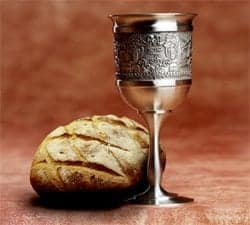As God writes the story of His covenant people in the world, with this Table at the center, we see that traitors and treachery are an important element in the story.
All four gospels have the story of Judas, which is certainly one indication of its importance. When Jesus talks about the Table of the Lord in John 6, He concludes this important discourse with a reference to His betrayal by Judas. The psalms prophesied the betrayal of Jesus by Judas, and how the betrayal would occur at the Table. The one who ate Christ’s bread, a companion with him, was the one who lifted up his heel against Him (Ps. 41:9). The same sense of betrayal by a close companion is expressed later in the psalms (Ps. 55:12-14).
The words of institution which I repeat each week include the very important phrase “on the night in which he was betrayed.”
Whenever this meal is faithfully observed, one of the signs that this is happening is that it will soon be unfaithfully betrayed. Servants are not greater than their master, and so we may expect the same sort of thing.
But when tender hearts hear this—when they hear about the possibility of betrayal—the natural reaction is like that of the first disciples. “Is it I, Lord?” No, eleven of the twelve, for all their faults, timidity, and confusion, did not betray the Lord. The fact that any sin is treachery “in principle” should not obscure for us the fact that there is such a thing as treachery proper, apostasy proper. So let us ask the question, as we should. “Is it I?” But then let us avoid morbid introspection in order to hear the answer. The Lord calls us His friends, and He summons us now. Those who are genuine traitors and hypocrites cannot bear to answer that summons for an extended period of time—while those who are tender in the Lord come at the invitation, and they come gladly.
So come, and welcome, to Jesus Christ.



It’s a good post, no real disagreement here.
But didn’t Jesus break bread with Judas? I’ve seen so much harm done to Christians because of bullying, human hierarchies, power plays, people being cast out of the tribe due to perceived, alleged treachery, often false accusations. It’s made me a real fan of open communion, even in the midst of betrayers,even in light of that risk.
Memi, Here is a pretty good reading of the Word that says Judas was at the pass over supper, but left before “communion”. So no, Judas did not break communion bread with Jesus. “So we may arrive at a sequence of events of that fateful evening: 1. Judas went to the Chief priests to betray Jesus for money (Matt. 26:14; Mark 14:10; Luke 23:2-6). 2. The disciples all ate at least the initial part of the Passover Supper (Mark 14:17; Luke 22:14). 3. After the intial part of the Passover Supper was ended, the devil puts it in Judas’ heart… Read more »
It’s been a raging debate since the dawn of time, Adad. Near as I can tell, both Aquinas and Augustine believed he did. Calvin refused to weigh in. One of our modern popes implied through their writings that they believed he was there, too. Myself, I rely on both of those psalms, 41:9 and 55:12-14, as well as the gospels, and to me they all seem to indicate that he was there and that the betrayal was complete, total. It doesn’t really matter, in the sense that I also believe in church authority, sovereignty to do what they want. It’s… Read more »
Memi, you and our host seem to be on the same page as follows:
“The Lord calls us His friends, and He summons us now. Those who are genuine traitors and hypocrites cannot bear to answer that summons for an extended period of time—while those who are tender in the Lord come at the invitation, and they come gladly.”
At Christ Church it sounds like formal church discipline instances are the only times when the invitation to communion is withdrawn on an individual basis.
Catholics can theoretically be banned from taking communion but it is rare. I hadn’t realized until recently that it is a matter of canon law, not just the priest’s discretion. But, ultimately, it is left to the conscience of the individual. If one takes the sacrament seriously, one is aware of the warnings about eating and drinking without discernment or while is a state of deadly sin. Who would want to risk that?
Doug, how do you handle session control of the Table?
My church is having this conversation. Do you meet with guests or do you state it publicly and trust guests on the honor system?
There’s a statement in the bulletin about who may partake, then it goes on the honor system. I think the general principle is the one Doug repeats in every communion meditation: So come, and welcome, to Jesus Christ. There are some churches so focused about fencing the table that they neglect to open the gate. I’m grateful that I’ve never seen that mentality at Christ Church!
Thank you, Kyriosity.
I certainly with this sentiment. Do you have a gist of the statement about who may partake?
I certainly AGREE with this sentiment.
I’m out of town, so I don’t have a bulletin handy to copy it for you. If you email the church office, I’m sure they could send it to you.
Will do, thanks.